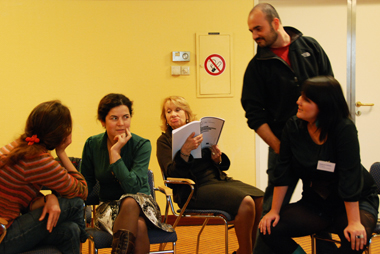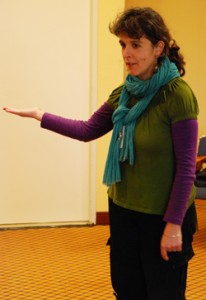“To humanize humanity”, that is the main goal of the Theatre of the Oppressed, an alternative theatre movement developed in 1971 by Brazilian theatre director Augusto Boal. It follows a system that enables people to act in the fiction of theatre to become protagonists of their own lives. During a one-day workshop at the DARE conference in Vienna, fifteen people from a dozen different nationalities got a taste of this unique method.

The goal was simple: to exchange, learn, and express experiences through a series of role-playing. The participants, all active in NGO’s or associations that deal with human rights and the promotion of democracy, quickly started to express themselves in a relaxed atmosphere. They played improvised scenes like “rich and poor”, “men and women”, “parents and children” to bring up issues related to their topics.
Most of the participants were beginners, just a few had already some experience with the Theatre of the Oppressed’s methods, but the non-formal aspect of it attracted all of them. Alberto Emiletti, an Italian staff member from Amnesty International says: “We had the possibility to learn new things by doing, not just listening. All these techniques will be useful”. An idea shared by German participant Tim Scholz: “It was not about lecturing, it was about learning by doing.”

French activist and trainer Laura de Witte facilitated the interactive workshop. De Witte, a former Spanish teacher in a “difficult Parisian neighborhood”, emigrated twelve years ago to Portugal where she is currently working on local issues and community social work. It is just five years ago that she discovered the Theatre of the Oppressed, but it has already become a really important issue to her. In her opinion, teaching these kind of alternative methods to adults is much harder than to children, “who are excited about coming up to a stage”.
De Witte doesn’t consider herself a teacher, but rather a facilitator or “a joker” who must help establish a cohesion between the group members without “leading” too much. And it works well. “Because you are laughing a lot and having fun with other people, imitating any kind of situation, it provides you with a dynamic to make cohesion within the group”, says Alexandra Jastrzebska, a French participant working in Catalonia.
Over all, the workshop had a pretty good impact on the participants. Nadejda Caprar, a consultant for the Norwegian Mission of Rule of Law Advisers to Moldova, was satisfied. “I found it a really interesting experience. It was a real inspiration to me, so I am thinking of contacting the workshop facilitator”. Rola Badran, a Palestinian working in the Lebanese Euromed HR network, agrees with Caprar: “It gave me a lot of ideas that I can use in my education work with youth and children. Despite the fact that we come from different backgrounds, our cultural concern are the same”.
Posted in 2008-11: DARE conference| 18.11.2008
By: Pierre-Anthony Canovas



